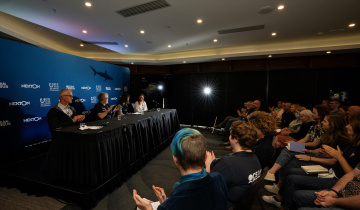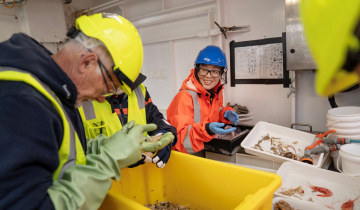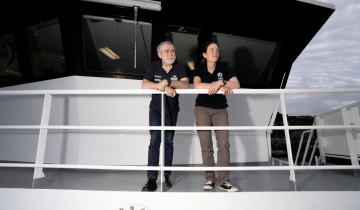Fifty intrepid travellers set off from Bluff tomorrow, onboard the Spirit of Enderby, a Russian ice-strengthened ship, destined for Antarctica and the sub-Antarctica. Organised by Dr Gareth Morgan, the Our Far South voyage aims to raise New Zealanders' awareness of this unique area.
The crew is made up of interested individuals, including television personalities Te Radar and Nick Tansley, as well as representatives from a range of science, educational, and industry, and environmental organisations.
"The more aware we are of the issues that face Antarctica," says Gareth Morgan, "the more likely our future governments are to make decisions that reflect an ongoing commitment to this region."
New Zealand's far south is the area of southern ocean, sub-Antarctic islands, and the area of Antarctica known as the Ross Protectorate.
The areas of focus for this trip are climate change, territorial aspirations of Antarctica, protecting biodiversity, over-fishing, tourism, and mineral exploration.
NIWA General Manager of Research Dr Rob Murdoch says the voyage is a unique opportunity to raise public awareness about the Southern Ocean and Antarctica, as well as the New Zealand scientific research that goes on there.
"As a major New Zealand and international provider of Antarctic and Southern Ocean scientific research NIWA is delighted to be involved in this voyage. NIWA is playing a key role in helping New Zealand and the world learn more about the Southern Ocean and the Antarctic – knowledge that will help everyone respond to the significant challenges this unique environment faces, such as climate change, a potential decline in biodiversity, the use of the area's natural resources, and the future influence this region will have on New Zealand."
Dr Murdoch will be presenting seminars about NIWA's work on Antarctica and the Southern Ocean to the crew onboard during the voyage.
One of the issues that Antarctica and the Southern Ocean face is climate change. The Southern Ocean plays a vital role in regulating the climate of the planet and evidence of man-made climate change is mounting. The best example of this is in ocean acidification.
In the last five decades, the peninsula has warmed at a rate of 2.5oC per century, the Ross Ice Shelf area at a more modest 1oC per century, while the pole itself shows no change.
There are various claims and treaties that govern territorial ownership in Antarctica.
Changes in the Antarctica will have a major impact on New Zealand's climate.
Climatic changes, along with the environmental impacts of humankind's hastening race for resources in Antarctica, could impact the wildlife of our far south.
The unique sub-Antarctic Islands, which are in the Southern Ocean, south to south-east of New Zealand, contain plants and fauna found nowhere else in the world. They are home to a wide array of species found nowhere else including albatrosses, penguins, parakeets, snipe and sea lions.
Good research, regulatory arrangements and compliance from users of resources in this region will be essential to the long-term wellbeing of many of these animals.
Organisations represented on the voyage include: Antarctica New Zealand, NIWA, VUW Antarctic Research Centre, GNS Science, University of Otago, Te Papa, Sanford, Ministry of Foreign Affairs and Trade, Department of Conservation, WWF and the Island Bay Marine Education Centre.
The Our Far South voyage is being run by Heritage Expeditions.
Follow Dr Rob Murdoch's blog at www.niwa.co.nz/antarctica/ofs/blog
Follow the Our Far South project online at www.ourfarsouth.org.
Get regular blog updates from Bob Zuur on wwf.org.nz and several other WWF websites.








